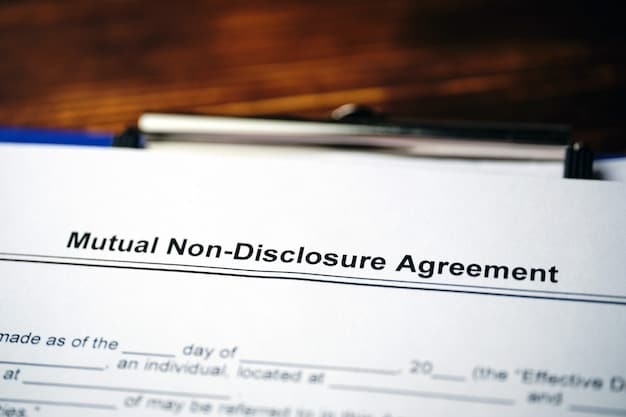How to Prepare for the 2025 IRS Independent Contractor Rules: A Compliance Checklist

How to Prepare for the Updated IRS Independent Contractor Rules in 2025: A Compliance Checklist involves understanding new guidelines, reviewing contractor agreements, and implementing systems for accurate classification and reporting to ensure compliance.
Navigating the complexities of independent contractor regulations can be daunting, especially with the ever-evolving landscape of tax laws. As we look ahead to 2025, it’s crucial for businesses to understand and adapt to the upcoming changes in IRS guidelines concerning independent contractors. This article provides a comprehensive checklist on how to prepare for the updated IRS independent contractor rules in 2025: A Compliance Checklist, ensuring your business stays compliant and avoids potential penalties.
Are you ready to safeguard your business against misclassification issues? Let’s dive into the essential steps to how to prepare for the updated IRS independent contractor rules in 2025: A Compliance Checklist.
Understanding the Current Independent Contractor Landscape
Before delving into the specifics of how to prepare for the updated IRS independent contractor rules in 2025: A Compliance Checklist, it’s essential to grasp the existing framework. The IRS has specific criteria for determining whether a worker is an employee or an independent contractor, and these classifications carry significant tax and legal implications.
Key Factors in Determining Independent Contractor Status
The IRS primarily focuses on three main categories to assess worker classification:
- Behavioral Control: Does the company control or have the right to control what the worker does and how they do their job?
- Financial Control: Does the company control the business aspects of the worker’s job, including how they are paid, whether expenses are reimbursed, and who provides tools and supplies?
- Relationship of the Parties: Are there written contracts or employee-type benefits (e.g., insurance, pension plan, vacation pay)? Will the relationship continue, and is the work performed a key aspect of the business?
Properly understanding these factors is the first step in how to prepare for the updated IRS independent contractor rules in 2025: A Compliance Checklist.
In conclusion, understanding these current guidelines and focusing on behavioral control, financial control, and the relationship of the parties involved are crucial first steps. By focusing on these specific factors, you can begin to confidently how to prepare for the updated IRS independent contractor rules in 2025: A Compliance Checklist.

Anticipating Changes in the IRS Independent Contractor Rules for 2025
The IRS frequently updates its guidelines to reflect changes in the economy and workforce. As we approach 2025, businesses need to stay informed about potential shifts in the classification standards. Staying informed is a critical step in how to prepare for the updated IRS independent contractor rules in 2025: A Compliance Checklist.
These expected changes may include:
- Stricter enforcement of existing rules to combat worker misclassification.
- Updates to the definitions of “behavioral control,” “financial control,” and “relationship of the parties.”
- Increased scrutiny of companies that heavily rely on independent contractors.
Staying Updated on Regulatory Changes
To effectively implement how to prepare for the updated IRS independent contractor rules in 2025: A Compliance Checklist, monitor official IRS publications, industry newsletters, and legal updates. Regularly consulting with a tax professional or legal advisor can provide tailored guidance for your specific business needs.
In conclusion, anticipate stricter enforcement and updated definitions by monitoring IRS publications and consulting with professionals. Staying informed is a critical component to effectively how to prepare for the updated IRS independent contractor rules in 2025: A Compliance Checklist.
Reviewing and Updating Independent Contractor Agreements
A well-drafted independent contractor agreement is crucial for establishing a clear understanding of the working relationship. As part of how to prepare for the updated IRS independent contractor rules in 2025: A Compliance Checklist, it’s essential to review and update these agreements periodically.
Key Elements of a Compliant Contractor Agreement
Your agreements should clearly define the following:
- Scope of Work: Clearly state the specific projects or services the contractor will provide.
- Payment Terms: Detail how and when the contractor will be paid, including any project-based or hourly rates.
- Independent Status: Affirm that the contractor is responsible for their own taxes, insurance, and benefits.
- No Control: Stipulate that the company does not have the right to control how the work is performed.
Ensuring these elements are included is an important part of how to prepare for the updated IRS independent contractor rules in 2025: A Compliance Checklist.
Finally, well-drafted agreements with clear scopes of work, payment terms, independent status affirmations, and stipulations that the company does not control how the work is performed are key considerations. These elements ensure that you are how to prepare for the updated IRS independent contractor rules in 2025: A Compliance Checklist.
Implementing Systems for Accurate Worker Classification
To effectively how to prepare for the updated IRS independent contractor rules in 2025: A Compliance Checklist, businesses must implement systems that ensure consistent and accurate worker classification.
Consider implementing the following measures:
- Conduct an internal audit of all existing contractor relationships to assess compliance.
- Establish a standardized process for evaluating and classifying new workers.
- Provide training to managers and HR staff on the nuances of independent contractor versus employee classification.
Best Practices for Worker Classification
When classifying workers, consider:
- Using a standardized questionnaire to gather information about the nature of the work, the level of control exerted by the company, and the worker’s business operations.
- Consulting with legal counsel to review borderline cases and ensure compliance with IRS guidelines.
By implementing these systems and following best practices you can efficiently how to prepare for the updated IRS independent contractor rules in 2025: A Compliance Checklist.

Maintaining Detailed Records and Documentation
Accurate and detailed records are essential for demonstrating compliance with IRS regulations. As part of how to prepare for the updated IRS independent contractor rules in 2025: A Compliance Checklist, it’s crucial to maintain thorough documentation of all contractor relationships.
Essential Records to Keep
Make sure to maintain the following records:
- Independent contractor agreements.
- Records of payments made to contractors.
- Documentation supporting the classification of each worker as an independent contractor.
Retain these records for at least three years from the date the tax return was filed or two years from the date the tax was paid, whichever is later.
Maintaining thorough, accurate, and detailed records is crucial for how to prepare for the updated IRS independent contractor rules in 2025: A Compliance Checklist. Agreements, payment records, and documentation supporting worker classifications should all be part of your record-keeping strategy.
Seeking Professional Guidance
Navigating independent contractor rules can be complex, and seeking professional guidance is a smart move for businesses. Consulting with tax advisors or legal experts is an important step to how to prepare for the updated IRS independent contractor rules in 2025: A Compliance Checklist.
Tax and legal professionals can provide the following assistance:
- Reviewing existing contractor agreements and identifying any areas of non-compliance.
- Advising on best practices for worker classification.
- Representing your business in the event of an IRS audit or dispute.
Benefits of Professional Consultation
Engaging with professionals can offer peace of mind and help ensure your business remains compliant with all applicable laws. It’s a worthwhile investment to protect your business. Seeking guidance helps you effectively how to prepare for the updated IRS independent contractor rules in 2025: A Compliance Checklist.
In summary, the expertise provided by professional guidance is a strategic move for businesses to effectively how to prepare for the updated IRS independent contractor rules in 2025: A Compliance Checklist. By seeking advice, you are reinforcing you compliance efforts.
| Key Point | Brief Description |
|---|---|
| 📝 Updated Agreements | Review and update contractor agreements for 2025 compliance. |
| 📊 Accurate Classification | Implement systems to ensure accurate worker classification. |
| 🗂️ Detailed Records | Maintain thorough records of all contractor relationships. |
| 👨💼 Professional Guidance | Seek expert advice on compliance measures. |
Frequently Asked Questions (FAQ)
The IRS primarily looks at behavioral control, financial control, and the relationship of the parties. These factors help determine the level of control a business has over the worker.
Staying informed helps you avoid penalties, ensure compliance, and maintain a clear understanding of your obligations as a business owner. It is the only way to how to prepare for the updated IRS independent contractor rules in 2025: A Compliance Checklist.
It should include the scope of work, payment terms, a statement affirming the contractor’s independent status, and that the company does not control work performed. All of these are vital parts of how to prepare for the updated IRS independent contractor rules in 2025: A Compliance Checklist.
Internal audits, standardized evaluation processes, and training for management and HR can help businesses properly classify workers and avoid misclassification penalties. Make sure to incorporate these into the overall strategy.
Detailed records, including agreements and payment records, demonstrate compliance to the IRS, especially in case of an audit. Maintaining good records is necessary to how to prepare for the updated IRS independent contractor rules in 2025: A Compliance Checklist.
Conclusion
Understanding and preparing for the updated IRS independent contractor rules in 2025 is essential for every business. By implementing a robust compliance checklist and staying informed, you can minimize risks and ensure that your company adapts smoothly to regulatory changes.
Taking proactive steps, businesses can maintain compliant and productive relationships with their independent contractors. This diligent preparation is key to how to prepare for the updated IRS independent contractor rules in 2025: A Compliance Checklist.





